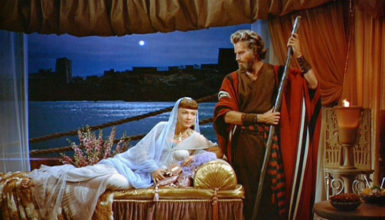Remember when Hollywood was obsessed with the Holy Bible? Probably not. If there’s one myth that has persisted over the last few decades of popular cinema, it is the claim that Hollywood hates religious films. On a mere surface level, the statement is erroneous, but the idea of Hollywood as some insidious den of iniquity and liberal atheism maintains. So persistent is this myth that whenever a Christian film premieres, observers and critics are thrown into a frenzy. “Since when has Hollywood been interested in God?” they wonder.
For all my agnosticism, I could not ignore the lure of the cross over the Easter and tuned into to see “The Ten Commandments.” The odd conflation of subject with message in art always confuses. Some non-religious people won’t watch a film about a religious person, while some religious persons won’t watch a film about someone on the fringes of societies. Movies are not sermons, at least not the good ones. Enter Cecil B. DeMille, famed producer of Hollywood’s “Golden” Age.

In the canon of biblical films, few are as notable as DeMille’s “The Ten Commandments.” The four hour epic is lengthy, but it’s an impressive milestone even amidst its marvellous technical accomplishments. The film has secured an immovable spot in my memory for the work of the woman near the man at the centre. Not the wife of Moses the saviour, but the Queen, Nefretiri, his forgotten lover, who was played by Anne Baxter.
Nefretiri is the throne princess of Egypt destined to marry the next Pharaoh. No film, even a biblical epic, is complete without romance and the love triangle of Moses/Nefretiri/Rameses, which persists for the rest of the film, does reek of a DeMillean inclination for increasing drama at any cost, but the conceit works. And it works because Nefretiri is the drama’s most intriguing character rising beyond the merely symbolic.
God has never been persona non grata in the movies. In fact, one of the greatest filmic paradoxes of Hollywood’s history centres on its unlikely relationship with Christianity. In particular, the decadent fifties stand out. Our immediate thoughts are of the goblets overflowing with bubbling champagne, the post-war sexual revolution, and general decadence. Except, it was during these same decadent fifties that Hollywood was making millions of dollars (and that’s not even adjusting for inflation) from the thing you might be least likely to expect – God. God and the Bible have been constants of cinema since the silent era but the interest turned into potent fervour in the fifties. The lavish costumes, the casts of thousands, the gargantuan sets – in typical form Hollywood was using whatever material was available from the Bible to reiterate the point that good triumphs over evil – and in the post-war ’50s DeMille’s religious interest was a deliberate symbol of the virtuous Americans prevailing over the godless Russians. The geopolitical issues of the Cold War era have not dissipated; they have only mutated.
Amid new global crises, Hollywood’s own America has its political issues to deal with. In this vein, then, it is not unsurprising that filmmakers might be falling back (albeit lazily) on religion to epitomise the good vs bad struggle. But, they miss what makes DeMille’s success possible.
Critically, Nefretiri most effectively emerges as more than a symbol. She loves Moses, so his Hebrew roots are irrelevant to her, unlike the other royals. She even, casually, murders a slave to protect the secret. There’s the steady suggestion that Nefretiri’s gumption runs deep so that she seems like a wiser idea for Pharaoh than her indecisive future husband, Rameses. The film asks, ‘How are we to feel about this woman?’
She’s the only character in the film whose “point” isn’t telegraphed to us with immediacy and it’s due to Baxter’s performance as much as it is to the narrative Nefretiri carries herself as if she knows something that those around her, specifically the men, don’t.
Credit again to DeMille for asking tough questions – how are we to feel about the death of Nefretiri’s son at the film’s end? In a move that still surprises in its earnestness, Nefretiri makes her way to Moses, the now-married lover who has spurned her, to warn him that his eldest son is in danger. Baxter persists in all her vampy glory, but the honesty of the scene always affects. When she urges, “But he is my son, Moses. You would not harm my son,” it catches the audience. How to respond? does it test our morality against our religion, Baxter is doing so much in the scene and it’s a moment like that which sells the later moment when her son does die. It is a scene that unusually becomes the most moving one in a film that we would expect to place its allegiance firmly with the Hebrew.
What makes this film work – something that religious films recently have completely lost the thread of – is that it’s not a sermon. It appeals by being compelling regardless of your religious allegiances. The problem today is less that we are served by a godless Hollywood than we are served by an oddly reverent one. The culture war of the 21st century isn’t just a collegiate or social issue, it has seeped into pop culture. For the better in some cases, but for the worse in others. There are few things as frustrating in artistic renditions as solemn seriousness which veers into the humourless. It’s why the decadent fifties were such a great time for the Biblical era. They were willing to wallow in the ‘muchness’ of it all. That’s why they worked. Anne Baxter’s verve, and The “Ten Commandments” ornateness, is proof.
Have a comment?
Write to Andrew at almasydk@gmail.com




